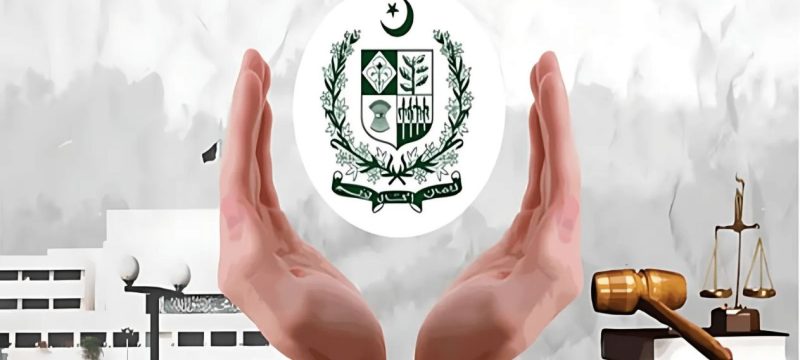The government has been actively pursuing what it calls judicial reforms since last month, aimed at serving the “wider interest” of the nation. This article details the proposed changes to the Constitution.
Recently, the ruling coalition has been engaging with various political parties in parliament to build support for constitutional amendments focusing mainly on the judiciary.
Read more: President Approves 26th Constitutional Amendment
The Constitution (Twenty-sixth Amendment) Act, 2024, known as the Constitutional Package, is a legislative measure that limits the Supreme Court’s suo motu powers, establishes a three-year term for the Chief Justice of Pakistan (CJP), and allows the prime minister to appoint the next CJP from the three most senior judges of the Supreme Court.
The Senate approved the amendment with a two-thirds majority on Sunday, followed by the National Assembly achieving the same majority early Monday.
An earlier attempt in September by the ruling Pakistan Muslim League-Nawaz (PML-N) to push through the amendments failed to secure support from the Jamiat Ulema-i-Islam-Fazl (JUI-F), preventing the legislation from being tabled even while the houses were in session.
A special parliamentary committee, created last month and consisting of members from all parties, including the Pakistan Tehreek-e-Insaf (PTI), has discussed various proposals over recent weeks.
Maulana Fazlur Rehman, leader of the JUI-F, played a crucial role in mediating as the opposition expressed concerns about the amendments and alleged intimidation of its lawmakers regarding their support for the draft.
One significant point of contention was the proposed establishment of a Federal Constitutional Court, which the PTI opposed. Instead, Fazl advocated for a constitutional bench, a demand now included in the act.
Although the JUI-F had previously reached a draft agreement with the Pakistan People’s Party (PPP) earlier this month, the PTI stated it had “no objections” to the final draft but officially boycotted the voting process.
The initial draft proposed 56 amendments, but after extensive discussions, this number was reduced to 27 in the final version passed by the National Assembly.
This piece details the amendments included in the act, which will take effect immediately.
Appointment of CJP; Expansion of Parliamentary Committee
The most significant amendments were made to Article 175A, which regulates the appointment process for judges in the Supreme Court, high courts, and the Federal Shariat Court (FSC).
Under the amendments to clause 3 of Article 175A, the CJP will no longer be appointed by the president from the “most senior judge of the Supreme Court.” Instead, the CJP will be selected based on recommendations from a Special Parliamentary Committee, which will choose from the three most senior Supreme Court judges. This committee will then send the nominated name to the prime minister, who will forward it to the president for the official appointment.
Previously, clause 8 stated that the Judicial Commission of Pakistan (JCP) could forward its nominations for judicial vacancies to an eight-member parliamentary committee, which would then relay the nominations to the prime minister, who would send them to the president.
Now, the amendment allows the JCP to send its nominations directly to the prime minister, who will then forward them to the president for appointment. As a result, clauses 9, 10, 11, 12, and 13 related to the previous eight-member committee will be eliminated.
A new clause, 3A, establishes that the Special Parliamentary Committee will consist of twelve members, including:
(i) eight members from the National Assembly; and
(ii) four members from the Senate.
The act specifies that if the National Assembly is dissolved, the committee will consist solely of the Senate members mentioned in paragraph (ii), with the provisions of this article still applicable.
Additionally, clause 3B mandates that “parliamentary parties shall have proportional representation on the committee, based on their strength in Majlis-i-Shoora (Parliament), to be nominated by their respective parliamentary leaders.” The chairman and the speaker of the National Assembly will notify the committee members.
Under clause 3C, the Committee must send its nomination “by a majority of not less than two-thirds of its total membership, within 14 days prior to the retirement” of the CJP. The act states that the first nomination under clause (3), following the enactment of the 26th Amendment, must be submitted “within three days prior to the retirement” of the current top judge.
A new clause, 3D, clarifies that “no action or decision taken by the Commission or the Committee shall be deemed invalid or challenged solely on the basis of a vacancy or the absence of any member from a meeting.”
According to clause 3E, the committee’s meetings must be held in-camera, and a record of the proceedings must be maintained. Clause 3F specifies that the provisions of Article 68—which prohibit lawmakers from discussing the conduct of any Supreme Court or high court judge in their duties—“shall not apply to the proceedings of the committee.”
Under clause 3G, the committee is empowered to “make rules for regulating its procedure.” Consequently, clauses 15, 16, and 17 of Article 175A, which were related to the previous eight-member parliamentary committee and mirrored clauses 3E, 3F, and 3G, will be removed.
The act amends clause (4) of Article 175A, which previously allowed the JCP to create rules governing its procedure. It now specifies that the JCP may “make rules regulating its procedure, including the process and criteria for assessing, evaluating, and determining the fitness for appointment of judges.”
The phrase “or a committee” is removed from clause 14, which originally stated: “No action or decision taken by the [JCP] or a committee shall be invalid or questioned solely on the grounds of the existence of a vacancy or the absence of any member from any meeting.”
Additionally, the CJP’s term is capped at a maximum of three years. This amendment is reflected in Article 179, which now states: “A Judge of the Supreme Court shall hold office until he reaches the age of 65 years unless he resigns or is removed from office according to the Constitution.”
This clause specifies that the CJP’s term “shall be three years or until he resigns, reaches the age of 65 years, or is removed from office as per the Constitution, whichever occurs first.” It also states that the top judge “shall retire upon completion of his three-year term, regardless of his age of superannuation.”
Another major amendment affects Article 184, which governs the Supreme Court’s original jurisdiction. The amendment restricts the Supreme Court’s suo motu powers by adding: “Provided that the Supreme Court shall not make an order or give direction or declaration on its own or in the nature of suo motu exercise of jurisdiction beyond the contents of any application filed under this clause.”
In a modification to Article 186A, the Supreme Court is now authorized to transfer cases from high courts to itself. The revised text states: “The Supreme Court may, if it considers it expedient to do so in the interest of justice, transfer any case, appeal, or other proceedings pending before any high court to any other high court or to itself.”
An amendment to clause 2 of Article 185, which deals with the Supreme Court’s appellate jurisdiction, stipulates that an appeal shall lie to the Supreme Court from any judgment, decree, final order, or sentence of a high court “if the amount or value of the subject-matter of the dispute in the court of first instance was, and also in dispute in appeal is, not less than one million rupees or such other sum as may be specified in that behalf by Act of [Majlis-i-Shoora (Parliament)],” replacing the previous threshold of “not less than fifty thousand.”
Additionally, clause 1 of Article 187 (Issue and execution of processes of the Supreme Court) will now include: “Provided that no order under this clause shall be passed otherwise than in pursuance of any jurisdiction vested in and exercised by the Supreme Court.”
Regarding the jurisdiction of high courts, a new clause 1A will be added under Article 199, which similarly removes the suo motu powers of high courts. Clause 1A states: “For removal of doubt, the high court shall not make an order or give direction or declaration on its own or in the nature of suo motu exercise of jurisdiction beyond the contents of any application filed under clause 1.”
Establishment of Constitutional Benches in the Supreme Court
A new Article 191A will be introduced to create Constitutional Benches within the Supreme Court.
Clause 1 states that these benches will consist of Supreme Court judges nominated and appointed by the Judicial Commission of Pakistan, ensuring representation from each province.
Clause 2 specifies that the most senior judge among those nominated will serve as the Presiding Judge of the Constitutional Benches.
Clause 3 limits other Supreme Court benches, excluding Constitutional Benches, to specific jurisdictions:
- (a) Original jurisdiction under Article 184;
- (b) Appellate jurisdiction under clause 3 of Article 185, particularly in cases involving constitutional questions or substantial legal interpretations;
- (c) Advisory jurisdiction under Article 186.
Clause 4 mandates that a minimum of five judges, chosen by a committee including the Presiding Judge and the next two most senior judges from those nominated, must hear and resolve such matters.
Clause 5 states that all petitions, appeals, or review applications pending in the Supreme Court before the implementation of the 26th Amendment will be transferred to the Constitutional Benches, which will exclusively handle them.
Clause 6 grants the judges nominated under clause 1 the authority to create rules governing the practices and procedures of the Constitutional Benches, subject to existing laws.
Constitutional Benches in High Courts
A new Article 202A will be added to facilitate the establishment of Constitutional Benches in high courts.
Clause 1 specifies that these benches will consist of judges nominated by the Judicial Commission of Pakistan.
Clause 2 designates the most senior judge among those nominated as the head of the Constitutional Benches.
These amendments aim to enhance the judiciary’s structure and address concerns about the powers held by the Supreme Court and high courts.
High Court Jurisdiction
Clause 3 stipulates that no high court bench, except for a Constitutional Bench, shall exercise the jurisdiction granted under Article 199 concerning the enforcement of constitutional rights.
Clause 4 requires a committee composed of the Head of Constitutional Benches and the next two senior judges to hear relevant matters.
Clause 5 mandates that petitions or appeals pending in a high court before the 26th Amendment will be transferred to the Constitutional Benches for resolution.
Appointment of Supreme Court Judges
The Judicial Commission of Pakistan (JCP) will not only appoint judges for these courts but also evaluate the performance of high court judges.
Key changes to Article 175A regarding the appointment of Supreme Court judges include:
- The Chief Justice of Pakistan (CJP) will continue as chairperson of the JCP, with a “presiding judge” also as a member.
- The number of the “four most senior” Supreme Court judges on the commission has been reduced to three.
- The requirement for a former CJP or Supreme Court judge to serve on the commission has been removed.
- The provision for a “senior advocate” has been modified to specify that the nominee must have at least 15 years of practice in the Supreme Court, still nominated by the Pakistan Bar Council.
- The law minister and the attorney general will remain members of the JCP.
Additionally, lawmakers will now participate in the appointment process, including:
- Two members from the Senate and two from the National Assembly, with equal representation from the treasury and opposition benches.
- If the National Assembly is dissolved, remaining members will be drawn from the Senate.
- A new provision requires the nomination of a “woman or non-Muslim” technocrat as a Senate member for a two-year term.
An explanation added clarifies that if the presiding judge is the CJP or one of the three most senior judges, the next senior judge will take their place.
Moreover, the amendment to Article 177 removes the previous requirement for experience as a judge of any high court in Pakistan before the amendment’s enactment.
These changes collectively aim to improve the accountability, diversity, and effectiveness of the judicial appointment process while curbing the extensive jurisdiction previously held by the Supreme Court and high courts.
Overview of Judicial Amendments
The recent judicial amendments seek to improve the structure and functionality of the judiciary, particularly focusing on the powers of the Supreme Court and high courts.
High Court Jurisdiction
Under Clause 3, only Constitutional Benches have the authority to exercise jurisdiction as outlined in sub-paragraph (i) of paragraph (a) and paragraph (c) of clause 1 of Article 199. This empowers high courts to instruct individuals engaged in government functions to comply with legal obligations or refrain from illegal actions. Furthermore, paragraph (c) allows high courts to issue orders to enforce fundamental constitutional rights.
Clause 4 mandates that a bench, chosen by a committee comprising the Head of Constitutional Benches and the next two senior judges, will hear and resolve relevant matters. Clause 5 requires all petitions or appeals relating to these jurisdictions, whether pending or newly filed before the enactment of the 26th Amendment Act, to be transferred to the Constitutional Benches for resolution.
Appointment of Supreme Court Judges
The Judicial Commission of Pakistan (JCP) will appoint judges to these courts and will also evaluate the performance of high court judges. Amendments to Article 175A, Clause 2 state that while the Chief Justice of Pakistan (CJP) continues as chairperson, a “presiding judge” will also be included in the commission. The number of senior Supreme Court judges serving on the commission has been reduced from four to three.
The previous requirement for a former CJP or Supreme Court judge to be nominated by the chief justice has been removed. A senior advocate with at least 15 years of practice in the Supreme Court will still be nominated by the Pakistan Bar Council. The law minister and the attorney general will remain as commission members. New provisions allow for the inclusion of lawmakers, with two members from both the Senate and the National Assembly representing both the government and opposition.
Additionally, a qualified woman or non-Muslim technocrat, nominated by the Speaker of the National Assembly for a two-year term, will be included. If the presiding judge is the CJP or one of the three most senior judges, the next senior judge will take their place.
High Court Judge Appointments
Changes to Article 175A will alter the appointment process for high court judges, particularly concerning the establishment of constitutional benches. The amendments replace the requirement for the “most senior Judge of that high court” with the “head of Constitutional Benches of that high court.” If the head is unavailable, a former chief justice or judge will be nominated by the Commission.
The minimum age for high court judges has been lowered from 45 to 40 years, with new eligibility criteria requiring at least 10 years of experience as an advocate or in a judicial office in Pakistan.
For the Islamabad High Court (IHC), the appointment process will now include a nominated advocate with 15 years of high court practice and a federal minister appointed by the prime minister.
Performance Evaluation of High Court Judges
New clauses added to Article 175A will establish a system for evaluating the performance of high court judges. The Commission will conduct annual evaluations and provide improvement periods for judges deemed inefficient. If performance remains unsatisfactory, reports will be submitted to the Supreme Judicial Council.
The Commission will be empowered to create rules defining effective performance evaluation standards, and a secretariat will be established to support its operations. Additionally, meetings can be called by one-third of the Commission members, with timelines set for convening.
Federal Shariat Court and Council of Islamic Ideology Amendments
An amendment to Article 203C now permits a judge qualified for the Supreme Court to serve as the chief justice of the Federal Shariat Court (FSC). Further changes in Article 203D require appeals under the 26th Amendment to be resolved within 12 months.
In Article 229, the threshold for parliament to refer questions to the Council of Islamic Ideology (CII) has been lowered from two-fifths to one-fourth of total membership. A new provision in Article 230 mandates that the CII’s final report must be considered within one year.
Additional Provisions
Paragraph (f) of Article 38 will now specify the complete elimination of riba (interest) by January 1, 2028. A new Article 9A grants everyone the right to a clean, healthy, and sustainable environment.
The Fourth Schedule has been updated to clarify local governance provisions in cantonment areas, especially regarding taxes and charges.
Summary of Key Amendments Regarding High Court Judge Appointments and Judicial Reforms
- High Court Judge Appointments:
- Constitutional Bench Creation: The procedure for appointing high court judges has been revised to involve the “head of Constitutional Benches” of that court instead of the “most senior Judge” as a member of the JCP.
- Removal of Seniority Requirement: The condition for the most senior judge to be part of the JCP has been eliminated. If the head of Constitutional Benches is the chief justice, the next senior judge will be included in the commission.
- Substitution of Chief Justice: If the chief justice is unavailable, a former chief justice or judge will be nominated by the commission, rather than the Chief Justice of Pakistan consulting with four judges.
- Eligibility Criteria:
- The minimum age for a high court judge has been reduced from 45 to 40 years.
- The requirement for judges to have been members of civil services or district judges has been removed.
- Islamabad High Court Appointments:
- The process now includes an advocate with at least 15 years of practice, nominated by the Islamabad Bar Council, and a federal minister appointed by the Prime Minister.
- Performance Evaluations:
- The commission will conduct annual performance evaluations of high court judges, allowing time for improvement if inefficiencies are identified.
- Reports on judges with unsatisfactory performance will be forwarded to the Supreme Judicial Council if no improvements are made.
- Federal Shariat Court and Council of Islamic Ideology:
- Criteria for the appointment of the Federal Shariat Court chief justice now includes a qualified FSC judge.
- Changes to references sent to the Council of Islamic Ideology (CII) now allow for questions to be referred if one-fourth of the assembly members demand it.
- Riba Elimination and Environmental Rights:
- The timeline for eliminating riba (interest) has been set before January 1, 2028.
- A new article guarantees the right to a clean and healthy environment.
- Additional Amendments:
- The Islamabad High Court can now establish rules for appointing court officers and staff.
- Article 48 states that inquiries into the advice given to the president by the cabinet will not be subject to court examination.
- Changes to articles related to the Federal Consolidated Fund now include expenses related to the judicial commission and election costs.
Conclusion
These amendments aim to improve the transparency and effectiveness of the judicial appointment process, establish mechanisms for evaluating judges’ performance, and address significant societal issues like climate change. The legal community supports these changes to enhance accountability and improve Pakistan’s judicial system.









